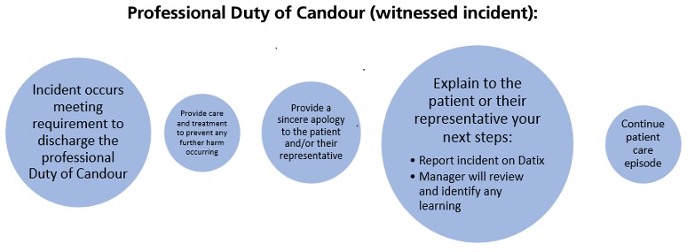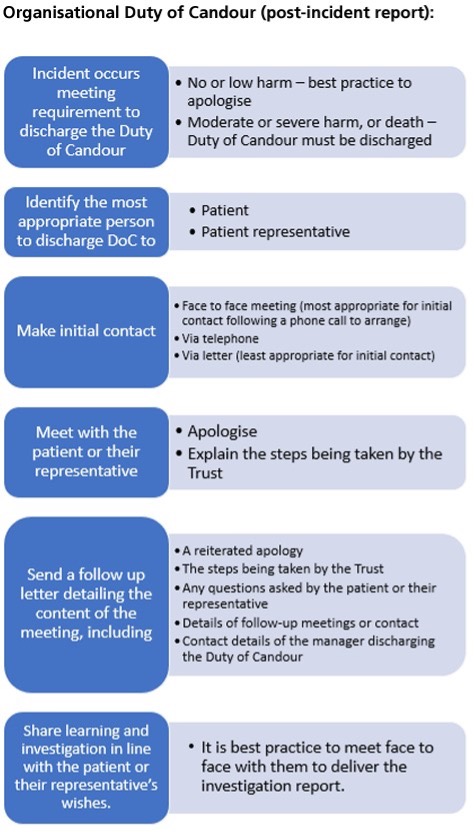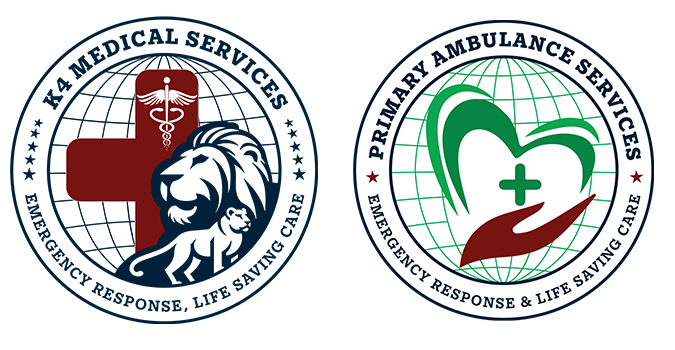| Author: | Jono Erodotou |
| Responsibility: | All Staff |
| Effective Date: | 01 June 2024 |
| Review Date: | 30th May 2025 |
| Approved By: | |
| Version Number: | 01 |
Amendment / Review History #
| Date | Author | Comments |
|---|---|---|
Introduction #
The Health and Social Care Act 2008 (Regulated Activities) Regulations 2014 describe statutory provisions regarding Duty of Candour (Regulation 20).
The regulation makes it a statutory requirement that health service providers act in an open and honest way to patients, and their families or carers, should their care not go to plan, and harm was caused to the patient as a result.
Being open about what happened and discussing patient safety events promptly, fully, and compassionately with patients and/or their carers can:
▸ Help patients and/or relatives heal following an adverse event.
▸ Provide an environment where patients and/or their carers, healthcare professionals and managers feel supported when things go wrong.
▸ Allow patients, their family, or their carers be involved in the investigation to ensure their opinions and ideas for improvements are included.
Purpose #
The purpose of this policy is to describe K4 Medical Services approach to discharging the Duty of Candour.
Duties #
Ops Manager / CQC Manager
The Ops Manager has overall responsibility for integrated governance, including risk management and clinical governance within the Company which includes the process, management, and response to the Duty of Candour process. The Director delegates the responsibility for patient safety to the Clinical Manager.
Clinical Manager
Clinical Manager is accountable for ensuring that the Company discharges its Duty of Candour in line with legislation.
Heads of Departments and General Managers
All managers working within the Company are expected to follow the Duty of Candour Policy and have a responsibility for ensuring that all patient safety events are acknowledged and reported as soon as they are identified in line with the companies Management of Incidents Policy. They should be aware that an individual member (or members) of staff/contractor might require support during the investigation and provide the appropriate help and guidance for them which may in some cases come from external agencies.
Senior managers are responsible for planning and discharging Duty of Candour as per this policy in relation to incidents occurring in their locality/area of work.
All Staff
All members of staff should make themselves familiar with this policy and the process to discharge their professional Duty of Candour.
This includes providing an immediate apology, rectifying any immediate concerns for the patient’s safety and explain the issue will be raised with managers for investigation.
All members of staff/contractors must report any adverse incidents via the incident reporting system and, in instances where Duty of Candour is required on behalf of the Company. This should be escalated to the manager on duty at the time of the incident.
Definitions #
Duty of Candour –
The statutory duty to be open and honest with patients, or their families, when something goes wrong which appears to have caused, or had the potential to have caused, harm.
Patient Safety Event –
An adverse event which caused, or had the potential to have caused, harm to a patient.
Serious Incident –
A patient safety event which meets the criteria set out in the NHS England SI Framework, 2015.
Identifying the need for Duty of Candour #
As soon as a patient safety event is identified where harm has occurred, the priority is to ensure appropriate clinical care is provided and action taken to prevent further harm. Whenever practicable, appropriate discussion and patient consent should be gained prior to providing additional treatment.
The following table outlines the parameters for implementing the Duty of Candour:
Incident:
No Harm (including near misses) or Low Harm
Action:
The Company considers it best practice to inform patients when something has gone wrong and apologise at the time of the event. No written apology will be provided.
Incident:
Moderate, Severe, or Catastrophic Harm
Action:
A verbal apology will be given as soon after the event as possible.
A written letter of apology will be sent by the manager.
A copy of the investigation report will be provided on completion of the investigation if those involved indicate that they would like to see a copy.
Further information relating to harm definitions can be found https://www.england.nhs.uk/wpcontent/uploads/2019/10/NRLS_Degree_of_harm_FAQs_-_final_v1.1.pdf
The Duty of Candour Process #
The following flowcharts demonstrate the responsibilities any member of Company staff/contractors should follow, after the need to implement the Duty of Candour has been identified:


Who to Inform
Wherever possible, Duty of Candour discussions must be held with the patient directly. This is not always possible, such as when the patient has died, or due to their circumstances or their age, or if the patient wishes someone else to represent them.
In instances where discussions are held with the patient, no consent is required. The manager must satisfy themselves that they are speaking with the patient. In all other instances, suitable consent must be gained prior to discussions commencing and should be requested in the initial contact. Further information about gaining consent can be found in the Mental-Capacity-Act
Making Initial Contact
Wherever possible, discussions should be held in person and, as such, an initial telephone call to briefly explain the need to meet and make arrangements is deemed as best practice. If there is uncertainty as to the most appropriate person to communicate with, or telephone contact details are not available, an initial letter should be sent asking the person to make contact so that Duty of Candour can be discharged.
Initial Duty of Candour Meeting
The individual delivering the Duty of Candour message to the patient, or their representative should be a senior member of staff, ideally responsible for the area in which the incident occurred. They should have a good grasp of the facts relevant to the incident and be aware of any interim findings so far in the investigation. Where possible, the senior manager should be supported by the investigating manager during this meeting to ensure the views of the patient and their representative are considered during the subsequent investigation.
The meeting must include:
▸ Introductions of all present and an explanation of why the meeting was arranged.
▸ An apology
▸ A detailed and honest account of all the facts that the Company currently has about the incident, and what action has been taken so far.
▸ An explanation of the level of investigation that is being conducted, how this will occur and the anticipated timescales.
▸ A discussion to determine any questions or concerns that the patient or representative specifically wish to be investigated.
▸ Agreement between parties of how often to be kept updated on the progress of the investigation.
▸ Gathering of facts from the patient or their representative as appropriate.
▸ Confirmation that a written summary of the meeting will be provided in a letter.
The content of the meeting must be documented in written notes and attached to the incident record. The facts must be communicated clearly, avoiding confusion, and must not either apportion blame or deny responsibility.
Any areas where there is disagreement should be deferred to a subsequent meeting after the investigation has completed. Where the incident investigation is still in progress then the patient/relatives/representatives, and/or the patient’s carers, will be informed that more information will become available and new facts may emerge as the investigation progresses.
The meeting should provide an overview of the incident reporting and investigation process, and the complaints procedure.
Where there are legal restrictions on the disclosure of information, these restrictions need to be made clear to all meeting attendees.
An explanation of the next steps needs to be given.
The patient/relatives/representatives and/or the patient’s carers should again be signposted to sources of emotional support or help that is available to them.
Follow up Letter
Following completion of the initial Duty of Candour meeting, a summary of the discussion must be presented to the patient or their representative in a letter format. This shall be sent as soon as is practical after the meeting occurred and a copy stored in the relevant incident record. The Duty of Candour letter template shall be used.
Subsequent Discussions and Sharing Findings
Similar considerations to the initial meeting need to be taken for any preliminary follow-up and subsequent meetings or correspondence. Factual feedback needs to be given on progressto-date and information provided on the investigation process. There should be no speculation or attribution of blame.
On conclusion of the investigation, the full findings of the investigation shall be shared with the patient or their representative, with a copy of the approved report provided to them if they wish to receive a copy. This will include the actions to be taken as a result of the investigation and the timeframes for completion. If the patient or their relative wishes to receive assurance in relation to completion of the actions, this will be offered in the form of a follow up letter.
If this is to be the last discussion, the patient/relative/representative and/or the patient’s carers should be asked if they are satisfied with the investigation and a note made in the records.
Contact details will be provided to the patient/relatives/representatives and/or the patient’s carers so that if further issues arise these can be linked back to the relevant case.
Support #
K4 Medical Services recognises the importance of appropriate support to patients and their relatives during difficult times. The Trust representative is responsible for discussing support needs with the patient or relatives and consider whether it would be appropriate to offer further support, i.e. through their GP, registered charities and other relevant organisations. If this is indicated, the member of staff could liaise with the safety team for appropriate signposting to the relevant service.
It is also acknowledged that staff involved in an incident involving requiring Duty of Candour implementation may require additional support. This will be accessed initially through their line manager, and other options include occupational health, the unions, or, in the case of complaints and PALS issues, the patient experience lead.
Documentation of Duty of Candour #
K4 Medical Services requires all communication relating to an incident, complaint, PALS enquiry or a claim to be documented, to establish a clear record of contact. Should a deviation be made from best practice, any rationale or reason for this must be documented.
Records of all meetings, telephone calls and letters sent must be kept, and attached to the relevant incident on the Trust’s incident reporting system.
A copy of the notes of any meetings with patients, their family and/or carers will be provided to all of the individuals present, for their own records.
The Duty of Candour record for each meeting will contain the following information:
▸ The time, place, date, and names of the attendees.
▸ Questions raised by the patient, family and/or carers or their representatives, and the answers given.
▸ Plans for follow-up as discussed.
▸ Copies of letters sent to patients, carers, and the GP.
▸ Copies of any statements taken.
Working Across Organisations #
K4 Medical Services will work collaboratively with other NHS and local authority partners in any investigation and subsequent action plans. There will be open communication with healthcare organisations, healthcare teams, staff, and patients and/or their carers to facilitate robust investigations and learning.
Erroneous Identification #
It is possible that upon investigation of an incident, initially thought to have caused harm, it is identified that this decision was made erroneously. In such circumstances the principles of truthful, timely and open communication continue to apply, with full and consistent explanations being provided to the staff involved, patient and/or carer and any relevant organisations. Similarly, the identification and dissemination of any learning points continues to be an important part of the Duty of Candour Policy.
General Principles of Openness and Honesty #
In order to ensure that K4 Medical Services complies with the general principles of openness, honesty and transparency, the Trust commits to the following:
▸ Publication of summaries of serious complaints via the public website and staff intranet (subject to patient/family approval).
▸ Publication of Discovery Interviews with patients via the public website and staff intranet (subject to patient/family approval).
▸ Sharing of key issues and learning from Serious Incidents, patient safety issues and complaints with the national ambulance groups to maximise service improvements wherever possible.
▸ Publication of trends and themes across the organisation to enable staff/contractors to assist in safety improvements.
Equality Impact Assessment #
K4 Medical Services has made every effort to ensure this policy does not have the effect of discriminating, directly or indirectly, against employees, patients, contractors, or visitors on the grounds of race, age, nationality, ethnic (or national) origin, gender, sexual orientation, marital status, religious belief or disability. This policy will apply equally to full/part time employees and contractors.




